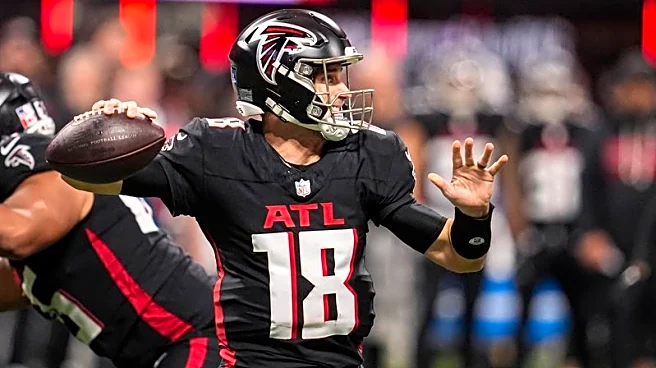What's Happening?
Kyle Tucker, a prominent outfielder and four-time All-Star, is set to become one of the most sought-after free agents in Major League Baseball for the 2025-2026 season. Tucker, who played for the Cubs
in 2025, is expected to command a contract exceeding $400 million due to his impressive performance despite injuries. His stats include a .841 OPS, 22 home runs, and 73 RBIs. MLB experts predict that Tucker will attract significant interest from top teams such as the Los Angeles Dodgers, Toronto Blue Jays, and New York Yankees. The Yankees, in particular, may be motivated to pursue Tucker following their recent loss to the Mets in acquiring Juan Soto.
Why It's Important?
The free agency of Kyle Tucker is significant for several reasons. Firstly, Tucker's potential signing could dramatically impact the competitive balance in MLB, as acquiring a player of his caliber can strengthen a team's lineup considerably. For the Yankees, securing Tucker could be crucial in maintaining their competitive edge, especially after missing out on Juan Soto. Additionally, Tucker's market value reflects the increasing financial stakes in MLB, where top players can command contracts in the hundreds of millions. This trend underscores the growing economic power of baseball franchises and the importance of strategic player acquisitions in shaping team success.
What's Next?
As the MLB offseason progresses, teams will likely intensify their efforts to sign Kyle Tucker, with negotiations expected to be complex given the high stakes involved. The Dodgers, Blue Jays, and Yankees are anticipated to be key players in these discussions, each offering different advantages such as market size, team performance, and financial resources. The outcome of Tucker's free agency will be closely watched, as it could set a precedent for future player contracts and influence team strategies in the upcoming season.
Beyond the Headlines
Beyond the immediate implications for MLB teams, Tucker's free agency highlights broader trends in professional sports, including the increasing influence of player performance metrics in contract negotiations and the role of financial analytics in team management. Additionally, Tucker's situation may prompt discussions about the sustainability of escalating player salaries and their impact on the sport's economic landscape.










